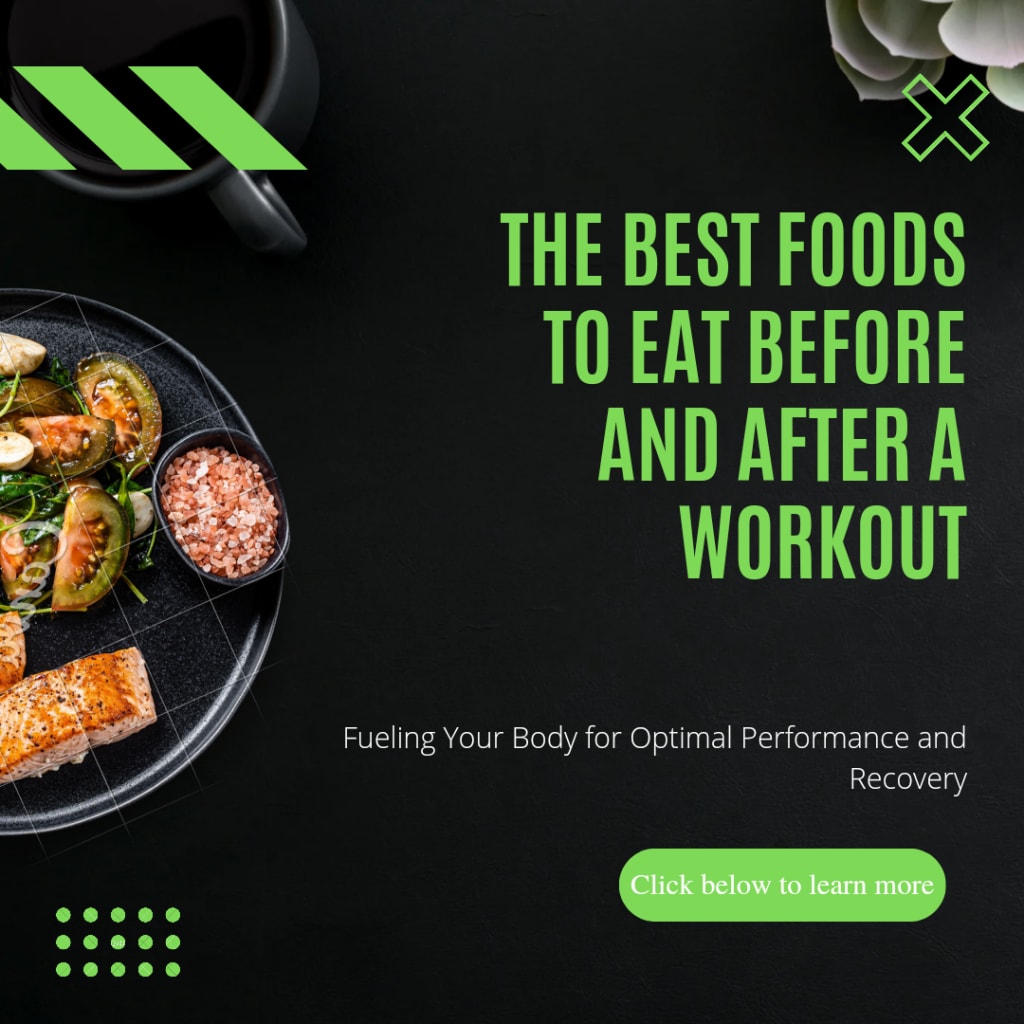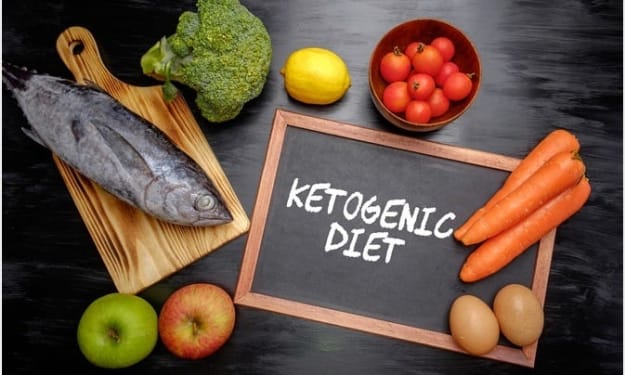The Best Foods to Eat Before and After a Workout
Fueling Your Body for Optimal Performance and Recovery

Whether you're a fitness enthusiast or a casual gym-goer, the foods you eat before and after a workout can have a significant impact on your performance, energy levels, and overall fitness gains. Proper nutrition is the key to maximizing your potential in the gym and enhancing your post-exercise recovery. In this comprehensive guide, we will explore the best foods to eat before and after a workout, providing you with valuable insights to fuel your body effectively and achieve the best results from your fitness routine.
Part 1: Pre-Workout Nutrition
1. Understanding Pre-Workout Nutrition
Pre-workout nutrition is about preparing your body to perform optimally during exercise. The right combination of nutrients can help boost energy levels, sustain endurance, and prevent fatigue, allowing you to push harder and achieve more during your workout. Proper pre-workout nutrition also helps maintain stable blood sugar levels, ensuring you stay focused and alert during exercise.
2. Carbohydrates: The Energy Source
Carbohydrates are the primary fuel for physical activity, providing the body with readily available energy. Opt for complex carbohydrates like whole grains, brown rice, quinoa, and sweet potatoes, as they release glucose into the bloodstream slowly, sustaining energy levels throughout your workout. Consuming carbohydrates before exercise also helps replenish glycogen stores in your muscles, giving you the stamina needed for longer, intense sessions.
3. Protein: Supporting Muscle Function
Protein plays a crucial role in pre-workout nutrition, supporting muscle function and preventing excessive muscle breakdown during exercise. Including a moderate amount of protein in your pre-workout meal can improve muscle recovery and growth. Opt for lean sources of protein like chicken, turkey, fish, tofu, or plant-based options such as lentils and chickpeas.
4. Healthy Fats: Long-lasting Energy
Contrary to popular belief, healthy fats are beneficial in pre-workout nutrition, especially for sustained energy during longer workouts. Sources of healthy fats include avocados, nuts, seeds, and olive oil. Consuming these fats before exercise can provide a steady energy supply and prevent the rapid fluctuations associated with sugary snacks.
5. Hydration: The Key to Performance
Proper hydration is vital for optimal workout performance. Dehydration can lead to reduced energy levels, decreased endurance, and impaired focus. Drink water throughout the day leading up to your workout, and consider consuming an electrolyte-rich beverage if you anticipate intense or prolonged exercise to replenish essential minerals lost through sweat.
6. Timing Matters: When to Eat
The timing of your pre-workout meal is crucial to avoid discomfort and optimize performance. Aim to eat a balanced meal containing carbohydrates, protein, and healthy fats about 1 to 3 hours before exercising. This timeframe allows your body to digest and absorb the nutrients, providing you with sufficient energy without feeling sluggish during your workout.
Part 2: Post-Workout Nutrition
1. The Importance of Post-Workout Nutrition
Post-workout nutrition is a critical aspect of the recovery process. After exercise, your body is primed to absorb nutrients to replenish energy stores and repair muscle tissue. Proper post-workout nutrition can help reduce muscle soreness, improve muscle protein synthesis, and enhance overall recovery, setting you up for future success in your fitness journey.
2. Protein: The Building Blocks of Recovery
Protein is essential for muscle repair and growth, making it a fundamental component of post-workout nutrition. Consuming protein after exercise provides your body with the necessary amino acids to rebuild and strengthen muscle tissue. Whey protein, found in dairy products, is a fast-digesting option, while plant-based sources like soy or pea protein are excellent alternatives for vegans or those with lactose intolerance.
3. Carbohydrates: Restoring Glycogen Levels
Replenishing glycogen stores in your muscles after a workout is vital for recovery and future performance. High-glycemic carbohydrates such as bananas, white rice, and potatoes are effective in rapidly restoring glycogen levels in the body. Combining carbohydrates with protein in your post-workout meal can also enhance glycogen replenishment.
4. Antioxidant-Rich Foods: Fighting Free Radicals
Exercise generates free radicals in the body, leading to oxidative stress and cellular damage. Consuming antioxidant-rich foods like berries, leafy greens, and dark chocolate post-workout can help neutralize these harmful free radicals, reducing inflammation and supporting overall recovery.
5. Hydration: Replenishing Fluids
Hydration is just as important after exercise as it is before. Replenish lost fluids by drinking water or a sports drink containing electrolytes to rehydrate and replace minerals lost through sweat. Proper hydration aids in nutrient transport, supporting muscle recovery and overall bodily function.
6. Timing Matters: When to Eat
The post-workout period, often referred to as the "anabolic window," is crucial for nutrient uptake and muscle recovery. Aim to consume a balanced meal containing protein and carbohydrates within 30 minutes to an hour after completing your workout to maximize the benefits of your post-exercise nutrition.
Part 3: Special Considerations
1. Personalization: Listen to Your Body
While general guidelines are helpful, personalization is key when it comes to pre and post-workout nutrition. Everyone's body is different, and individual needs and preferences can vary. Pay attention to how different foods make you feel and adjust your nutrition plan accordingly to optimize your workout performance and recovery.
2. Intensity and Type of Exercise
The intensity and type of exercise you engage in can influence your nutritional requirements. For instance, endurance activities like long-distance running may require more carbohydrates, while resistance training may demand higher protein intake for muscle repair and growth.
3. Dietary Restrictions
If you have specific dietary restrictions or follow a particular eating plan (e.g., vegan, vegetarian, gluten-free), it's essential to find suitable alternatives that fulfill your nutritional needs without compromising your workout performance or recovery.
4. Avoid Processed and Sugary Foods
While some processed or sugary snacks may seem convenient, they can hinder your workout performance and overall health. Stick to whole, nutrient-dense foods and avoid excessive added sugars and unhealthy fats.
Proper pre and post-workout nutrition are essential components of a successful fitness journey. The foods you eat before exercise provide your body with the energy and nutrients necessary to perform at its best, while post-workout nutrition supports recovery and muscle repair. By incorporating a balanced intake of carbohydrates, protein, and healthy fats into your workout routine, staying hydrated, and choosing antioxidant-rich foods, you can optimize your performance, achieve your fitness goals, and enjoy the full benefits of an active and healthy lifestyle. Remember, the key is to listen to your body, make informed choices, and consistently fuel it with the nourishment it deserves. With the right nutrition and dedication to your fitness regimen, you'll be well on your way to a stronger, fitter, and healthier you.





Comments
There are no comments for this story
Be the first to respond and start the conversation.